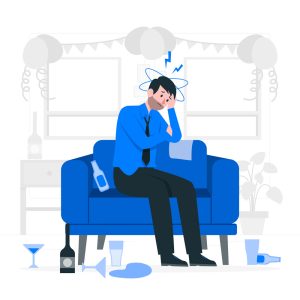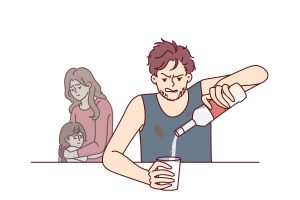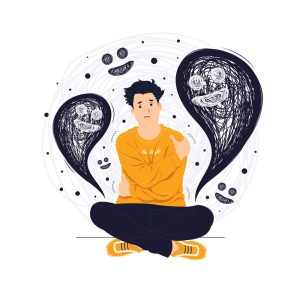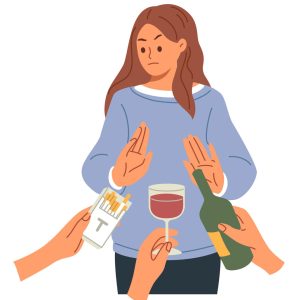Do you feel what started as social drinking has now become alcohol addiction? Did you begin using drugs for fun or under peer pressure but it has now turned into a dangerous habit that you can’t let go of? If your addiction has taken over your life so much that your relationship, career, or health is suffering, perhaps it’s time to seek professional help at a de-addiction and rehabilitation center.
But how do know if it’s time to seek professional help? Here are five tell-tale signs:

I. You Are Experiencing Health Issues
Prolonged use of alcohol and drugs like cocaine, amphetamines, and heroin could damage essential organs, including your liver, pancreas, heart, brain, and immune system. As addiction starts taking a toll on your physical and mental health, your body will display warning signs.
From physical symptoms like poor personal hygiene, unexplained weight loss or gain, and frequent nausea to a weakened immune system that causes a slower rate of recovery from minor ailments and makes you fall ill frequently, a lot of health problems can arise. You may even experience cognitive issues, such as blackouts, difficulty concentrating, or memory lapses.
If you notice such symptoms or other unexplained health issues, it’s time to seek professional care at the earliest by contacting a reliable de-addiction and rehabilitation center.
 2. You Are Neglecting Responsibilities
2. You Are Neglecting Responsibilities
When addiction starts interfering with your daily responsibilities, it strongly indicates that things have spiraled out of control and you need professional help.
Missing deadlines, not showing up at work, or poor professional performance due to lack of focus, hangovers, or fatigue can become common occurrences. As you start investing more money to fund your addiction, you may start neglecting crucial financial responsibilities like saving or paying bills. Excessive time spent on addiction and recovering from the resultant effects can also make you ignore household chores and responsibilities like cleaning, cooking, or childcare.
If you have started neglecting your work, household, and financial responsibilities, it will be wise to consider getting yourself admitted to a de-addiction and rehabilitation center to get help from experts.

3. Your Relationships Are Suffering
Your relationships can take a beating when addiction triggers distrust, tension, and emotional distance.
You may be lying, neglecting, breaking promises, or acting deceitfully, which can adversely affect your relationships. The desire to hide your addiction from family and friends can make you stay isolated due to shame or guilt. To avoid these people, you may even start hanging out with a new set of people oblivious to your addiction.
If your life’s vital relationships have started eroding, you must seek professional help to mend your way and repair and rebuild those connections that act as your support system.

4. You Are Experiencing Withdrawal Symptoms
Once your body becomes physically dependent on a substance, not getting it will make your body react negatively, which is called a withdrawal symptom.
Withdrawal symptoms could include physical discomforts like shaking, excessive sweating, inability to sleep, headaches, muscle aches, stomach problems, runny nose, frequent yawning, lacrimation, or nausea. You may also experience psychological or emotional effects such as anxiety, irritability, restlessness, intense cravings, or depression. Severe withdrawal symptoms could involve dangerous complications like hallucinations or seizures.

5. You Have Tried but Just Can’t Quit
If you recognize and accept your alcohol or drug addiction and decide to take matters into your own hands, you could be tempted to rely on sheer willpower and quit. However, addiction is complex and could make it difficult to quit on your own despite repeated attempts.
You may remain clean for a few days, only to resume the habit of drinking alcohol or using drugs, which can make you feel frustrated and a failure. Even when you don’t have intense cravings or relapse, you could be unable to maintain a long period of sobriety. Experiencing a growing sense of despair about ever being able to quit can also make you feel dejected.
If you notice any or all of the above, seeking professional help from a de-addiction and rehabilitation center can give you the strategies and tools you need to quit.
Final Words
Overcoming alcohol addiction and other substance abuse issues becomes easier when you get the medical support and care from professionals of a de-addiction and rehabilitation center like Nav Jeevan Kendra.
From addiction counseling to the therapeutic community program, yoga, meditation routines, and Milieu therapy, Nav Jeevan Kendra De-addiction & Rehabilitation Centre equips you with the tools and strategies to leave your addiction days behind. With its comprehensive aftercare programs, Nav Jeevan Kendra facilitates your reintegration into society and a healthy family life.
Since you are in a safe, non-stigmatizing, supportive, and friendly environment offered by Nav Jeevan Kendra, the journey to recovery and rehabilitation no longer seems like an uphill task.


